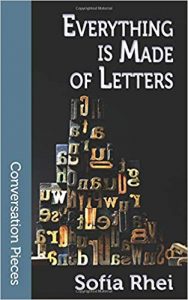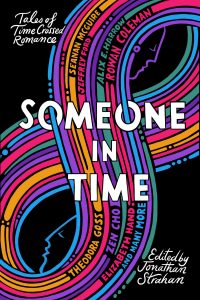Ian Mond Reviews Everything is Made of Letters by Sofía Rhei
 Everything is Made of Letters, Sofía Rhei (Aqueduct 978-1-61976-149-0, $12.00, 152pp, tp) February 2019.
Everything is Made of Letters, Sofía Rhei (Aqueduct 978-1-61976-149-0, $12.00, 152pp, tp) February 2019.
Since 2004, Aqueduct Press has published a small paperback series, called Conversation Pieces, that aims to “document and facilitate the grand conversation” of feminist science fiction. The more than 60 volumes issued so far collect essays, poetry, novellas, and short fiction authored by an impressive range of writers, a veritable who’s who of the field including Eleanor Arnason, Lucy Sussex, Vandana Singh, Lisa Tuttle, and Rachel Swirsky (just to name a random five). I’m embarrassed to say that, despite being aware of Conversation Pieces, until now I’d not picked up a book in the series. If Volumes 66 and 67 are indicative of the quality, then I have quite a bit of catching up to do.
Volume 66 comes from Sofía Rhei, a Spanish author with 35 published titles to her name, who writes for children, young adults, and adults in a variety of modes and genres. The five reprinted short stories that comprise Everything is Made of Letters are interested, as the title suggests, in the power of language, both as a form of communication, but also as a weapon of oppression and freedom. We see this expressed in the opening story, “Techt”, set in a future where language – both written and verbal – has been reduced to one hundred symbols. This limited lexicon, known as Techt, was invented by a woman named Hypatia hoping to establish a universal language. Decades later, Hypatia’s great-grandson, Ludwig, is one of the few people who still understands “Long Language.” He works for the State, translating the classics into Techt so they can be adapted into films (In Search of Lost Time, one of the longer productions, has a run-time of 35 minutes). Ludwig’s life changes forever when, on the day he loses his job to a computer, he is approached by two teenagers eager to be taught Long Language. “Techt” is a conversation about the trend we’ve seen over the last decade, spurred on by Twitter and an explosion of emojis, to simplify the way we communicate. Rhei does take the piss out of this phenomena: at one point Ludwig observes “a group of adolescents, each carrying two mobile devices, simultaneously typing with both thumbs while chatting among themselves.” The story is also a thought experiment, one that genuinely considers what it would mean to design a universal language, with Rhei going to great efforts to illustrate a consistent and logical symbology. That makes “Techt” sound dry and dull, but when the piece takes an Orwellian turn, it becomes a chilling cautionary tale, suggesting that oppression thrives in environments where language is simplified, where there’s no avenue to express complex ideas and thoughts.
The next two stories, “The BubbleLon Cyclotech” and “Secret Stories of Doors” are mirrors of each other, featuring dystopias where fiction and creativity are rare and treasured commodities. “The BubbleLon Cyclotech” – a tale inspired by Jorge Luis Borges’s “The Library of Babel” – is set in an alternate timeline where a climate catastrophe has poisoned the atmosphere and forced the inhabitants of London, now BubbleLon, to live under a dome. With natural resources scarce – paper is made from silk worms – all of literature has been archived on negatives held in a library – the Cyclotech – which also houses a massive printing press. However, when a rowdy school kid destroys one of the half a million words forged on rare metal plates used to print the negatives, the cyclotecharian, Edwinta, bans all children from the Cyclotech. In the “Secret Stories of Doors”, we’re introduced to Perucho, who lives under a totalitarian regime and works for the World Encyclopaedia where he is meant to be writing up verifiable facts deemed worthy by the government. What he’s actually doing is entering a series of fake documents, reports, and scholarly articles about a fictional 15th-century author whose work was thought lost forever. Unlike Edwinta, who treats literature as sacred and irreplaceable, protecting it from the grubby fingers of underserving children, Perucho is risking his life to share his imaginary worlds with as many people as possible. The moment where Perucho discovers a secret society who admire his work, who have fannish questions about his fictional scholar, is profoundly moving: I struggled to hold back the tears. Both these strange, thoughtful tales, with their alternative histories, wear their appreciation for literature and all things imaginative on their sleeves (I loved how Rhei weaves the work of H.G. Wells and Oscar Wilde into her worldbuilding). Importantly, though, both leave us with the message that the human need to share stories can’t be subdued, can’t be locked up in a library or regulated by an oppressive regime.
The collection is rounded off by two very entertaining stories. “Learning Report” is a neat twist on a familiar science fiction trope of the linguist invited to learn an incomprehensible alien language. The brilliantly titled “You Cannot Kill Frownyflute” is a satire about an incredibly popular creator, think J.K. Rowling or George R.R. Martin, who loses control of their world and characters to a massive fanbase and brand managers.
Ian Mond loves to talk about books. For eight years he co-hosted a book podcast, The Writer and the Critic, with Kirstyn McDermott. Recently he has revived his blog, The Hysterical Hamster, and is again posting mostly vulgar reviews on an eclectic range of literary and genre novels. You can also follow Ian on Twitter (@Mondyboy) or contact him at mondyboy74@gmail.com.
This review and more like it in the August 2019 issue of Locus.
 While you are here, please take a moment to support Locus with a one-time or recurring donation. We rely on reader donations to keep the magazine and site going, and would like to keep the site paywall free, but WE NEED YOUR FINANCIAL SUPPORT to continue quality coverage of the science fiction and fantasy field.
While you are here, please take a moment to support Locus with a one-time or recurring donation. We rely on reader donations to keep the magazine and site going, and would like to keep the site paywall free, but WE NEED YOUR FINANCIAL SUPPORT to continue quality coverage of the science fiction and fantasy field.






